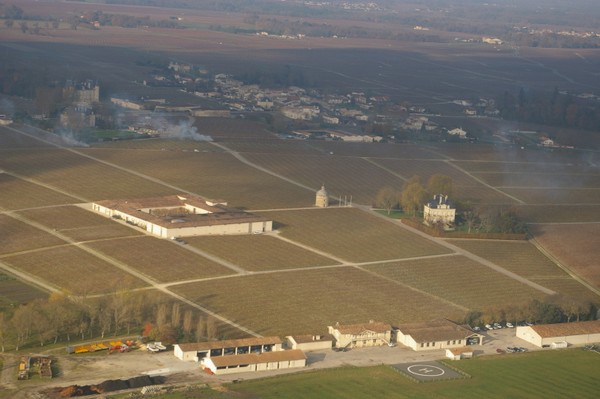Are we about to see the beginning of the end of the annual Bordeaux en primeur campaign?
For as long as I have been following wine, a key point in the calendar has been the Bordeaux en primeurs, when cask samples are shown to the trade and press six to seven months after harvest, and then the young wines are sold as futures.
It’s a situation many have complained about, because it seems stacked heavily in favour of the Chateaux. The samples are unfinished wines, and not the final blends (necessarily); the critic scores are then used to sell the wines. There’s a lot of hype around the whole event. Bordeaux effectively shouts, ‘look at me!’ for two weeks. Or more.
Well, first-growth Chateau Latour (pictured above) has decided to quit primeurs. This will be its last. That’s huge news. It was broken in a blog post by James Suckling, and the news spread fast on twitter. Chris Kissack has confirmed that this is indeed true in a very balanced piece.
Not only have Latour decided not to take part, but they have also decided to only release their wines when they think they are ready. That’s smart. They can afford to hold on to stock, and then speculators and pension funds don’t make their margin. I reckon many of the top properties have been holding onto a fair bit of their wine for the last few years anyway.
If too many other top properties go the same way, then primeurs will collapse. The buzz will have gone. In some ways, that’s a good thing, because primeurs sucks. But, as Kissack points out, the people who really need the cash flow this brings will be left stranded. That would be a real shame.
9 Comments on The beginning of the end of Bordeaux primeurs?
Jamie,
With all due respect, the news was broken on Twitter before James Suckling posted it on his blog. The Negociants that have an allocation (all 12 of them), had received “the letter” this morning.
“the people who really need the cash flow this brings will be left stranded” – why is it a shame? Why should the wine business be different from all other businesses? Big Bordeaux is and was always a matter of marketing and profit – if the money now ends in other pockets – so what? Same thing happend when the grand cru market went online: shops closed down, companies failed, …
Intersting, very interesting how wine, sometimes a nice drink for that matter, can be reduced to some speculation matter.. A hype fuelled by prestigious Chateaux being reduced to some drama, due to a shit vinteage like 2011.
It’s a good thing IMO. The super inflated prices of some, scratch that, most of the Bordelais and Burgundois enabled those with large lump sum investments to get he good stuff, leaving others (myself included so there may be some bias here) to scrabble over Village wines (despite these being outstanding recently, especially 2009).
Let’s see how this pans out. It may be more of the same with HK based “investors” still able to inflate prices of some wines – maybe there will be more medium range bottles affordable to more of us.
Jamie
You really seem to be anti Bordeaux in this post. You also come across bitter in the last paragraph. I agree about the state of the samples presented to the buyers/journalists.
Latour have been edging towards this decision for some time. They have significantly reduced the amount of negociants who distribute their wines and also reduced the amount of wines released. Yes the Chateaux controlled the high prices in 2009 and 2010 and very few investors, collectors and drinkers have seen an upside. But the system in Bordeaux certainly works well between the Chateaux and the negociants. It will be interesting to see if anyone follows Latour or if they distance themselves further from the Bordeaux trade.
The whole en primeur process does seem like a far away fairy-tale land. Will be interesting to see what happens form here but I suspect not much will change because of the markets demands for premium wines.
The end of en primeurs? No chance. They will go on without Latour. What I’d like to see is some auditing of samples to make sure that the wines shown in April are as close to the finished wine as possible.
Interesting that the news broke on Twitter. That’s increasingly the case.
We are all buzzing about Big Bordeaux and their “greediness”. Do you really think that the bordelais are making bigger profit than, let’s say, Casella Wines (with their Yellow Tail)? Or other well-known brands in the wine world? Yes, maybe we cand afford an Yellow Tail, but in the end it’s all about making money. For everyone in the wine business
The only additional cost that Latour will incur (due to the announced paradigm-shift) is the opportunity cost of inventory (i.e., financial holding cost) for the stocking period. Insurance and physical storage costs will increase just in case of extended bottle aging (or prolonged speculation).
In a market environment of negative interest rates and ample liquidity, it doesn’t seem like a bad idea to me.